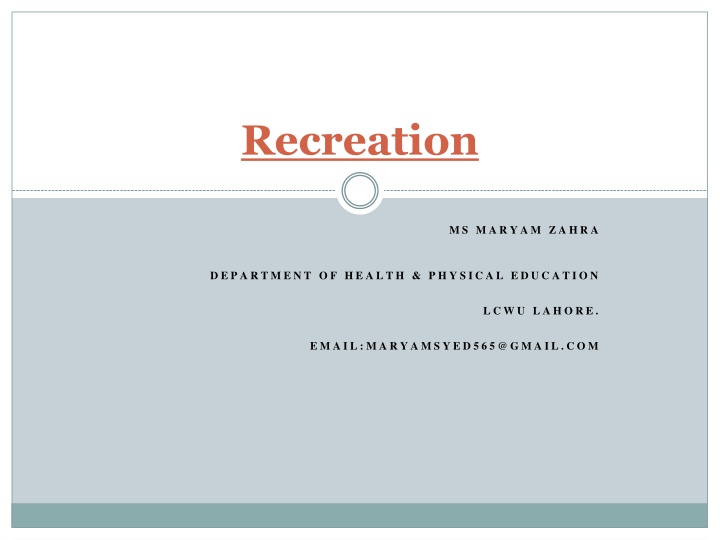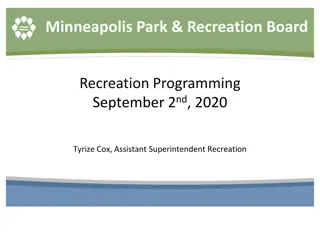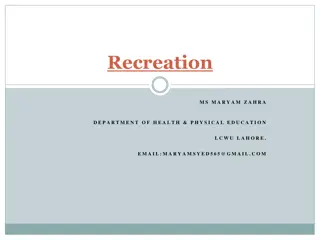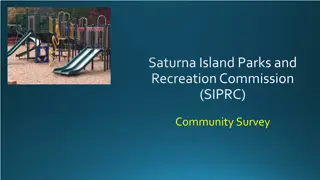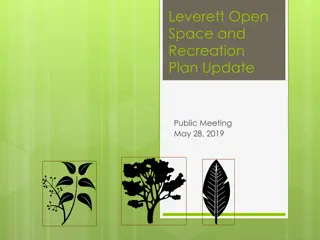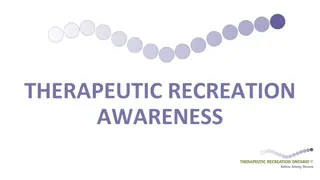The Importance of Recreation for Physical and Mental Health
Recreation plays a crucial role in improving physical and mental wellness, reducing stress, and enhancing overall quality of life. Engaging in recreational activities such as outdoor exercises can lead to lower doctor visits, improved body mass index, and better mental health outcomes. Accessible recreation areas also contribute to social cohesion and community well-being.
Download Presentation

Please find below an Image/Link to download the presentation.
The content on the website is provided AS IS for your information and personal use only. It may not be sold, licensed, or shared on other websites without obtaining consent from the author.If you encounter any issues during the download, it is possible that the publisher has removed the file from their server.
You are allowed to download the files provided on this website for personal or commercial use, subject to the condition that they are used lawfully. All files are the property of their respective owners.
The content on the website is provided AS IS for your information and personal use only. It may not be sold, licensed, or shared on other websites without obtaining consent from the author.
E N D
Presentation Transcript
Recreation M S M A R Y A M Z A H R A D E P A R T M E N T O F H E A L T H & P H Y S I C A L E D U C A T I O N L C W U L A H O R E . E M A I L : M A R Y A M S Y E D 5 6 5 @ G M A I L . C O M
Recreational Activities People who take part in park activities such as walking, hiking, or skiing, schedule fewer office visits, maintain lower body fat percentages, and have lower blood pressure and cholesterol levels. Mental wellness is critical to overall physical health. Participating in recreational activities helps manage stress.
Definition Activity done for enjoyment when one is not working. Recreation is an activity of leisure, leisure being discretionary time. The "need to do something for recreation" is an essential element of human biology and psychology
Importance of recreation Taking part in recreational activities, particularly outdoors, can improve your physical wellness. In fact, people who frequently take advantage of park activities have fewer doctor visits, lower body mass indexes and lower systolic blood pressures than those who don't, according to Dr. Laura L. Payne of the University of Illinois. A 2005 California State Parks report also highlights that outdoor recreation provides an excellent opportunity to increase exercise. It cites a 2001 study revealing that the availability of recreational facilities in a location impacts the amount of physical activity in which residents participate. Physical Benefits of Recreation
Mental wellness is critical to overall physical health. Participating in recreational activities helps manage stress. Taking time to nurture oneself provides a sense of balance and self-esteem, which can directly reduce anxiety and depression. Mental Health Improvements
Recreation areas provide gathering places for families and social groups, as well as for individuals of all ages and economic status, regardless of their ability to pay for access. Parks and recreation programs provide places for health and well-being that are accessible by persons of all ages and abilities, especially to those with disabilities. Recreation is linked to improving quality of life. Access to parks and recreation opportunities has been strongly linked to reductions in crime and to reduced juvenile delinquency. Recreation programs and parks provide a sense of public pride and cohesion to every community Social Importance
Classifications of Recreational Activities Spectator Type 1. 2. Participant Type
Spectator Type People spend their time watching the event and derive enjoyment from it. Participant Type People do not gain enjoyment merely by watching; they do so by joining the activity.
Active Type People have to function effectively in promoting. the action . Passive Type People have no excessive movement in performing the task or action
Physical and Mental Physical Activity People exerts efforts and bodily functions in performing the action. Mental Activity The mind is doing the functions with less body movement.
Public Type Involves the general public. Private Type Confined to people working in a private companies. Commercial Type Endorsing products which are open to everybody.
Characteristics of Recreation Involves Activity No single form Determined by motivation Occurs in unobligated time Voluntary participated Universally sought and practical By- products Gives direct satisfaction
Values in Leisure and Recreation Physical Health Psychological Health Social well-being Emotional stability Big business
Scope of Recreation Indoor Activities Games and Sports chess, parlor games b. Dance Activities: stop dance, trip to Jerusalem c. Music Activities: singing, instrumental playing d. Drama Activities: story telling, comedy skits e. Arts and Crafts: origami, pop- up cards f. Hobby and Collecting Activities: cooking, dancing, stamp collections, antique collection Outdoor Activities a. Games and Sports: dual and team sports b. Dance Activities: street dancing, aerobics c. Music Activities: singing contest during fiesta d. Nature and Outdoor Activities: camping, hiking, field trips, picnic, excursions e. Arts and Crafts: painting, drawing f. Hobby and Collecting Activities: f.1. bowling, tennis, f.2. billiard, fishing
Leisure free time when you're not meeting social or bodily needs" Social needs are things like work and chores Bodily needs are mainly eating and sleeping Most people spend the rest of their time doing some form of recreation Participating in leisure and recreation activities can help you better manage depression. Leisure provides you the chance to find balance in your life; it also puts you in control of how you're spending your time, which is an important consideration because you may feel overwhelmed by obligations. stress and reduce
A great stress reliever. Encourage you to take a break. Offer new challenges and experiences. Allow you to explore yourself and your talents. Help improve your career. Can provide additional income. Help you build self-confidence and improve your self-esteem. Allow you to meet new people.
Increases in Leisure Time People now have more leisure time than they used to. This is because: We spend less time working and have more holidays More people are retiring earlier More unemployment - as machines make jobs easier and so requiring fewer people Less household chores - machines are also making our home chores easier, for example washing machines and dish washers For these reasons, people are spending more time on recreational activities. Therefore the need is also there for more facilities and services for people to do this. This is why there has been a large growth in the leisure industry in recent years.
Influence of Others What type of sports you play, and whether you play sports at all, is heavily influenced by the people around you - family and friends. Family Some parents encourage their children into sports Some sports need lots of specialist equipment and clothing and so some might not be able to afford it Parents are needed to transport their children to and from training and competitions
Friends / Peers The group of friends that you spend most of your leisure time with. This is your peer group. Young people tend to get involved in and enjoy the same activities as their peers The groups attitude towards sport rubs off on the individuals, so if they don't like sport the individual will start playing less sport and vice versa
